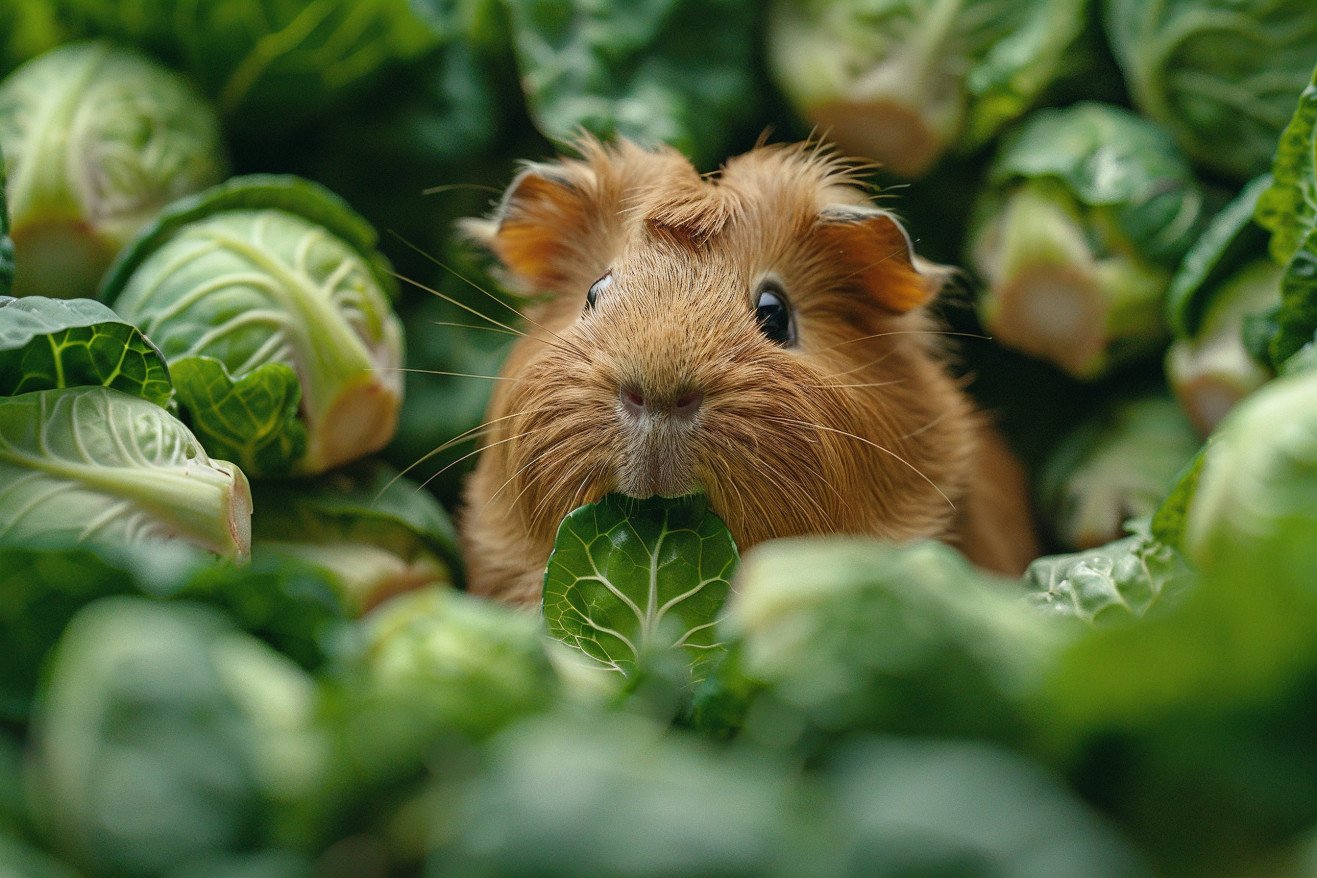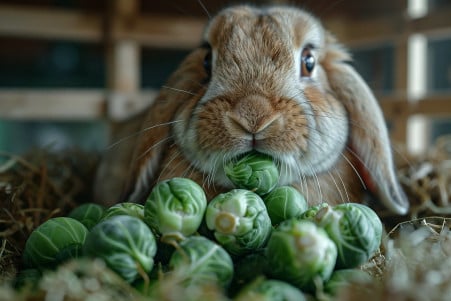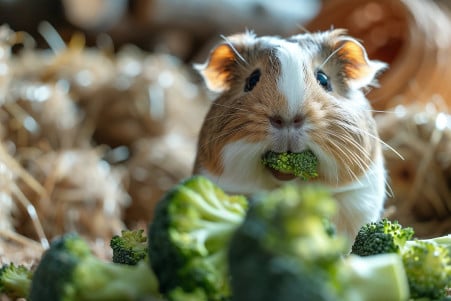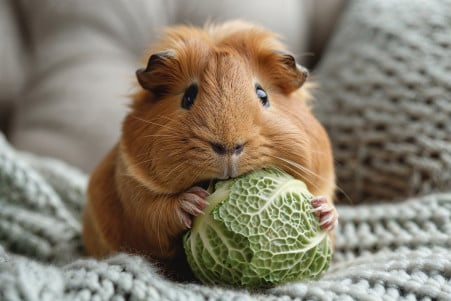Can Guinea Pigs Eat Brussels Sprouts? Safe Feeding Practices Explained
16 March 2024 • Updated 14 March 2024

Brussels sprouts are a healthy vegetable that many people enjoy, but can you share them with your guinea pig? The answer is yes, guinea pigs can eat Brussels sprouts, but they should only be given to your pet in moderation. This is because they contain oxalic acid, which can be harmful in large amounts. It’s best to limit your pet to one sprout to avoid digestive issues like gas and bloating.
This article will use veterinary input and nutritional research to help you better understand the impact of feeding Brussels sprouts to guinea pigs. It will cover the most recent information from animal nutrition studies, explain the basics of guinea pig dietary requirements, and discuss the effect of oxalic acid on their well-being.
By looking at a combination of research and expert advice, you’ll have the information you need to make the best choices for your guinea pig’s diet and health.
Can guinea pigs eat Brussels sprouts?
Nutritional Value of Brussels Sprouts for Guinea Pigs
Guinea pigs can enjoy the nutritional benefits of Brussels sprouts if they’re fed in moderation. According to the GuineaDad Food Blog, Brussels sprouts are high in Vitamin A, which is important for eye health and the immune system, at 754 IU per serving.
They’re also high in Vitamin C, at 85 mg per 100 g, which is especially important for guinea pigs since they can’t make their own Vitamin C and need it to avoid scurvy. Finally, they contain Vitamin K, which is important for blood and bone health, at 177–5g per 100 g.
On the other hand, these cruciferous vegetables also contain oxalates, which can cause kidney stones and other urinary problems in guinea pigs if consumed in large amounts. As a result, guinea pig owners should feed their pets three to four Brussels sprout leaves once or twice a week to make sure they’re not eating too many.
This way, guinea pigs can enjoy the antioxidant properties and fiber-related digestive benefits of Brussels sprouts without the risk of getting too many oxalates.
Meanwhile, the Humane Society notes that guinea pigs need a diet that’s made up mostly of hay, with some nutrient-rich vegetables added in. The vitamins in Brussels sprouts are a good fit for guinea pigs’ needs, especially when you consider how important Vitamin C is and how important it is to make sure guinea pigs get a variety of vegetables for their overall health.
What Is Oxalic Acid and How Does It Impact Guinea Pigs?
Oxalic acid is found in many plants and vegetables and can bind to minerals to create compounds like calcium oxalate. Although it is a natural part of many diets, it can be toxic when consumed in large amounts.
In guinea pigs, oxalic acid toxicity can cause kidney stones and even renal failure, as reported in a case study in PMC by Marie K. Holowaychuk. The case study in PMC reported that a guinea pig suffered from renal failure after consuming oxalate-rich plant material, which led to a rapid decline in health and the animal being euthanized.
A more general review of oxalate poisoning in domestic animals in the Journal of Animal Physiology and Animal Nutrition found that non-ruminants like guinea pigs are more susceptible to oxalate poisoning than ruminants because they lack the rumen bacteria that break down oxalate.
To avoid toxicity, it is important for feeders to follow safe guidelines and to introduce oxalic acid–rich foods like Brussels sprouts slowly.
Owners can help reduce the impact of oxalates and promote good health by making sure their guinea pigs have a well-rounded diet that includes a variety of vegetables. As a result, it’s important to make sure that a guinea pig’s diet is well-balanced and takes these factors into account.
How to Maintain a Healthy Diet for Your Guinea Pig
Guinea pigs require a diet that is high in fiber and essential nutrients, especially Vitamin C, which they can’t produce themselves. According to UK Pet Food, guinea pigs’ natural diet consists of grasses, plants, and vegetables, with hay being especially important for maintaining healthy teeth and digestion.
The NCBI Bookshelf explains that a high-fiber diet that closely resembles the guinea pig’s natural diet is essential. ExoticDirect recommends fresh Timothy hay for adult guinea pigs as it helps keep their teeth from getting too long and supports their gut health.
Vitamin C in the diet is essential to prevent scurvy, and leafy greens like kale are a great way to get it.
However, it’s important to avoid foods that are high in calcium and sugar as they can lead to urinary tract problems and obesity, respectively.
It’s also important to make sure that guinea pigs are getting a well-rounded diet; sudden changes in their diet can lead to digestive problems, so it’s important to slowly introduce new foods, like Brussels sprouts.
The Guinea Pig Gut
The guinea pig gut is unique, with the cecum being a particularly important part of the digestive system. The cecum, a large blind-ended pouch, is important for fermentation and helps the guinea pig break down fibrous foods like hay and leafy greens.
A paper in Animals explains that the cecum’s microbial community is responsible for the fermentation of complex carbohydrates and the synthesis of essential nutrients, and that the cecum is therefore a key digestive organ. The gut microbiota, which is made up of a variety of beneficial bacteria, is important for the fermentation of foods like Brussels sprouts.
The guinea pig’s digestive system also includes the practice of coprophagy, or eating their own feces. This helps guinea pigs recover nutrients, especially B vitamins and fiber, that may not have been absorbed during the first pass through the digestive system.
A study in PMC explains that even small changes in the guinea pig’s diet can lead to severe digestive problems, so it’s important to make sure that the guinea pig’s diet is consistent and well-balanced.
When feeding guinea pigs Brussels sprouts, it’s important to keep in mind the guinea pig’s digestive system. While the guinea pig’s digestive system is well-equipped to handle fiber, the fact that Brussels sprouts contain oxalic acid means that they need to be fed in moderation.
The guinea pig’s gut is well-equipped to handle fiber, but it’s sensitive to things that can disrupt the balance of the microbiota. However, the cecum’s fermentation and digestion processes, along with coprophagy, mean that guinea pigs can eat Brussels sprouts safely as long as they’re fed in moderation.
The Impact of Cruciferous Vegetables on Guinea Pig Health
Cruciferous vegetables, including Brussels sprouts, broccoli, and cabbage, are packed with essential nutrients and have been shown to have a number of health benefits. A review in Frontiers in Pharmacology even found that cruciferous vegetables can help prevent chronic diseases because of their anti-inflammatory, antioxidant, and chemoprotective properties. For guinea pigs, these vegetables can help provide essential nutrients and may even help prevent cancer.
That said, it’s also important to note the potential drawbacks. For example, overconsumption of cruciferous vegetables can lead to gas and dietary imbalances. And for guinea pigs specifically, there are two potential concerns: the presence of glucosinolates – which are the compounds that make cruciferous vegetables so healthy – and the production of allylnitrile, a compound that a study in PubMed found caused behavioral changes in mice exposed to high levels.
So, while there are certainly benefits to feeding guinea pigs Brussels sprouts, it’s important to consider the potential for gas and the potential impact of allylnitrile.
Even though cruciferous vegetables may be healthy, it’s still important to make sure that guinea pigs are eating a balanced diet. This will help ensure that guinea pigs can benefit from the nutrients in cruciferous vegetables without experiencing any negative side effects, and that they can continue to eat a diet that supports their health.
Final Thoughts on Giving Brussels Sprouts to Guinea Pigs
For the sake of your guinea pig’s health and happiness, it’s best to think of Brussels sprouts as an occasional treat instead of a regular part of their diet.
As we’ve discussed throughout this article and as Guinea Piggles notes, the most important thing to remember when feeding your guinea pig Brussels sprouts is that they are high in oxalic acid, so they should be given in moderation. This way, your guinea pig can get the nutrients they need from the sprouts without the risk of developing bladder stones or other health problems.
When given in moderation, Brussels sprouts can be a good addition to your guinea pig’s diet because they are high in vitamins A, C, and K, according to GuineaDad. These vitamins help with important things like vision, the immune system, and blood and bone health. GuineaDad recommends giving your guinea pig a few leaves once or twice a week to make sure they get a good balance of these important vitamins.
Overall, the best way to make sure your guinea pig is eating a healthy diet is to make sure they are getting a variety of foods and that their diet is well-balanced.
This means being careful about the foods that can cause health problems if they are overeaten. If you stick to these rules, you can make sure you are feeding your guinea pig a diet that will help them live a long and happy life.


